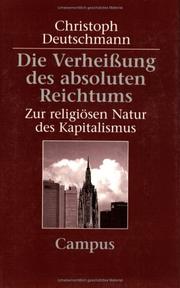| Listing 1 - 10 of 13 | << page >> |
Sort by
|
Book
ISBN: 9783531159454 9783531911656 3531159453 3531911651 Year: 2008 Publisher: Wiesbaden : VS Verlag für Sozialwissenschaften : Imprint: VS Verlag für Sozialwissenschaften,
Abstract | Keywords | Export | Availability | Bookmark
 Loading...
Loading...Choose an application
- Reference Manager
- EndNote
- RefWorks (Direct export to RefWorks)
Der Band fasst die neueren Publikationen sowie einige Originalbeiträge des Autors zur Arbeits- und Wirtschaftssoziologie zusammen, in denen eine gesellschaftstheoretische Interpretation kapitalistischer Dynamik entwickelt wird. Zentrale Themen sind die Wahlverwandtschaft zwischen Kapitalismus und Religion und der daraus abgeleitete dynamische Ansatz der Analyse wirtschaftlicher Institutionen. Darüber hinaus geht es darum, diesen Ansatz für die Erklärung aktueller Transformationsprozesse der Arbeitswelt und der Finanzmärkte fruchtbar zu machen.
Sociology of religion --- Sociology of work --- Social Sciences, general. --- Sociology. --- Sociologie --- Social Sciences --- Sociology --- Capitalism --- Money --- Social aspects. --- Religious aspects. --- Social sciences. --- Economic sociology. --- Social Sciences. --- Sociology, general. --- Organizational Studies, Economic Sociology. --- Economics --- Sociological aspects.

ISBN: 3593368838 Year: 2001 Publisher: Frankfurt am Main Campus
Abstract | Keywords | Export | Availability | Bookmark
 Loading...
Loading...Choose an application
- Reference Manager
- EndNote
- RefWorks (Direct export to RefWorks)
Book
ISBN: 3761058713 Year: 1973 Publisher: Frankfurt am Main Athenäum
Abstract | Keywords | Export | Availability | Bookmark
 Loading...
Loading...Choose an application
- Reference Manager
- EndNote
- RefWorks (Direct export to RefWorks)
Book
ISBN: 3658262273 Year: 2019 Publisher: Wiesbaden : Springer Fachmedien Wiesbaden : Imprint: Springer VS,
Abstract | Keywords | Export | Availability | Bookmark
 Loading...
Loading...Choose an application
- Reference Manager
- EndNote
- RefWorks (Direct export to RefWorks)
Der Band fasst die neueren Publikationen sowie einige Originalbeiträge des Autors zur Arbeits- und Wirtschaftssoziologie zusammen, in denen eine gesellschaftstheoretische Interpretation kapitalistischer Dynamik entwickelt wird. Zentrale Themen sind die Wahlverwandtschaft zwischen Kapitalismus und Religion und der daraus abgeleitete dynamische Ansatz der Analyse wirtschaftlicher Institutionen. Darüber hinaus geht es darum, diesen Ansatz für die Erklärung aktueller Transformationsprozesse der Arbeitswelt und der Finanzmärkte fruchtbar zu machen. Der Inhalt Die Wahlverwandtschaft zwischen Kapitalismus und Religion.- Die Dynamik wirtschaftlicher Institutionen.- Aktuelle Transformationsprozesse der Arbeitswelt.- Finanzmärkte und "Finanzialisierung" Die Zielgruppen Sozial- und Wirtschaftswissenschaftler Der Autor Dr. Christoph Deutschmann ist Professor (i.R.) für Soziologie an der Universität Tübingen.
Book
ISBN: 0429875118 0429464266 042987510X Year: 2019 Publisher: New York : Routledge,
Abstract | Keywords | Export | Availability | Bookmark
 Loading...
Loading...Choose an application
- Reference Manager
- EndNote
- RefWorks (Direct export to RefWorks)
This book offers a sociological analysis of globalised capitalist markets, advancing the notion of 'disembedded markets' to challenge the idea of 'social embeddedness' common in economic sociology. Avoiding an exclusive focus on institutions, networks and trust relationships surrounding markets, the author concentrates on private property as the key institution of markets, in order to emphasise the historical origins of modern capitalism the free market narrative, and develop a socio-historical analysis of the disembedding process together with an account of the built-in contradictions and limits of market universalisation. Through an analysis of their encompassing character, this volume demonstrates that disembedded markets do not fit standard theoretical accounts of sociality - a problem taken up not only by Karl Marx, but also by Friedrich August von Hayek and Niklas Luhmann - and questions the attempts of the emerging approach of 'economic theology' to draw parallels between the practices that arise from disembedded markets and from forms of religious experience and ritual. A rigorous examination of the phenomenon of disembedded markets and the claims to which they give rise concerning the equivalences between religion and capitalism, this book will appeal to scholars of sociology and economics with interests in capitalism, social theory, and global markets.
Book
ISBN: 9783531157269 Year: 2010 Publisher: Wiesbaden Verlag für Sozialwissenschaften
Abstract | Keywords | Export | Availability | Bookmark
 Loading...
Loading...Choose an application
- Reference Manager
- EndNote
- RefWorks (Direct export to RefWorks)
Book
ISBN: 3593338300 Year: 1987 Publisher: Frankfurt Campus
Abstract | Keywords | Export | Availability | Bookmark
 Loading...
Loading...Choose an application
- Reference Manager
- EndNote
- RefWorks (Direct export to RefWorks)
Book
Year: 1976 Publisher: Paris : Champ Libre,
Abstract | Keywords | Export | Availability | Bookmark
 Loading...
Loading...Choose an application
- Reference Manager
- EndNote
- RefWorks (Direct export to RefWorks)
Depressions --- Business cycles. --- Crises économiques --- Cycles économiques
Book
Year: 1996 Publisher: Thousand Oaks (Calif.): Sage
Abstract | Keywords | Export | Availability | Bookmark
 Loading...
Loading...Choose an application
- Reference Manager
- EndNote
- RefWorks (Direct export to RefWorks)
Book
ISBN: 3889811612 9783889811615 Year: 2004 Publisher: Berlin: Wichern-Verlag,
Abstract | Keywords | Export | Availability | Bookmark
 Loading...
Loading...Choose an application
- Reference Manager
- EndNote
- RefWorks (Direct export to RefWorks)
| Listing 1 - 10 of 13 | << page >> |
Sort by
|

 Search
Search Feedback
Feedback About UniCat
About UniCat  Help
Help News
News